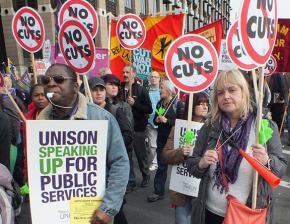On the march against the cuts
reports on mass marches that drew tens of thousands of people across the UK in a show of strength against the government's austerity agenda.
TENS OF thousands of British workers took part in mass marches against austerity in London, Glasgow and Belfast on October 20.
The protests, organized by Britain's national labor federation, the Trades Union Congress (TUC), featured the latest in a series of direct actions by activists protesting cuts in disability benefits. Police turned out in large numbers to protect Starbucks coffee shops after it was rumored that the anti-cuts group UK Uncut intended to target the chain for avoiding taxes.
Several media estimates put the number of marchers in London as high as 150,000, much higher than had been expected. Thousands more marched in Belfast and Glasgow.
Speaking from the stage in London, TUC General Secretary Brendan Barber emphasized the march's "A Future that Works" slogan. "We are sending a very strong message that austerity is simply failing," Barber said. "The government is making life desperately hard for millions of people because of pay cuts for workers, while the rich are given tax cuts."

The coalition government, which includes the Conservative Party and the smaller Liberal Democrats, came to power in 2010 due to mass disillusionment with the way in which the Labour Party had handled the economic crisis. Since then, Prime Minister David Cameron and Chancellor (or finance minister) George Osborne have pursued a relentless campaign of cuts in public spending and attacks on working-class living standards.
Although the stated aims of this austerity agenda were to cut Britain's budget deficit and spur growth in the private sector, neither has been accomplished. The British economy went into a double-dip recession earlier this year, and unemployment remains at over 8 percent.
The scale of austerity in Britain does not match the attacks in Eurozone countries like Greece, Portugal and Spain. But Cameron is presiding over the deepest cuts ever made to the British welfare state.
So far, tens of thousands of public-sector workers have lost their jobs thanks to the cuts, and economists estimate at least 700,000 will do so before 2017. If this figure becomes a reality, the Tories will have taken state employment to one of its lowest levels since the Second World War.
THE HUGE marches last weekend were just the latest manifestations of mass anger against poverty and austerity in Cameron's Britain.
In November and December of 2010, thousands of British students clashed with police in protests against a huge increase in university tuition fees. In August of last year, racist policing sparked several days of rioting in a number of English cities. And in November 2011, up to 2 million public-sector workers went on strike against government plans to cut their pensions.
Despite attempts to whip up "patriotic" fervor during the Queen's Jubilee and the London Olympics this summer, the coalition government has become deeply unpopular. The latest polls show Labour leading the Conservatives by 10 percentage points and growing numbers of voters losing faith in the economic management of Cameron and Osborne.
Anger at the dire state of the economy is reinforced constantly by the arrogance and elitism of Cameron's government. Just the day before the union marches this weekend, a leading Conservative politician, Chief Whip Andrew Mitchell, was forced to resign following a widely publicized incident in which he referred to police officers as "plebs."
Nevertheless, the Labour Party isn't presenting itself as a genuine alternative to the coalition. The victory of Ed Miliband in the Labour leadership election two years ago represented a blow to the followers of ex-leader Tony Blair on the right of the party. But Miliband has failed to forcefully challenge the austerity agenda, merely criticizing some aspects of the scale and the pace of the cuts.
Miliband had his chance to make a case against the austerity agenda when he spoke at the TUC protest on Saturday. Instead, he faced boos and heckling from a section of the crowd after promising that Labour, too, would make "hard choices"--read: more cuts--if it came to office.
For now, the unions represent the best hope for a genuine resistance to austerity. The public sector strikes of last year successfully mobilized over 2 million workers and showed a real willingness to fight. Moreover, as British socialist Richard Seymour wrote in the Guardian last week, these unions are well positioned to lead a broad coalition against the cuts. Public-sector workers can, Seymour noted, "link their direct material interests with those of every other group aggrieved by Tory policies."
In signs that a real escalation may be on the cards, the TUC has apparently begun consulting its member unions about the viability of a one-day general strike to protest the cuts. On Saturday, two of Britain's most militant union leaders--Mark Serwotka of civil servants' union PCS and Bob Crow of the railworkers' RMT--received loud cheers from the crowd when they called for such an action.
If it were to take place, this would be Britain's first general strike since 1926 and would involve up to 6 million workers. It would be a major step forward for the anti-cuts movement and would undoubtedly represent the biggest challenge yet to Cameron's government.
Coming on the heels of a new wave of strikes in Greece, this weekend's mass marches may indicate that British workers are about to embark on their own season of struggle.


